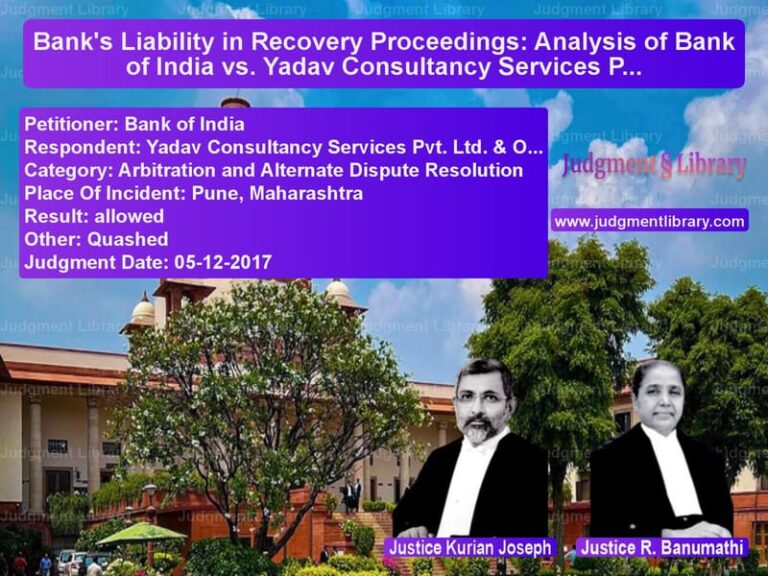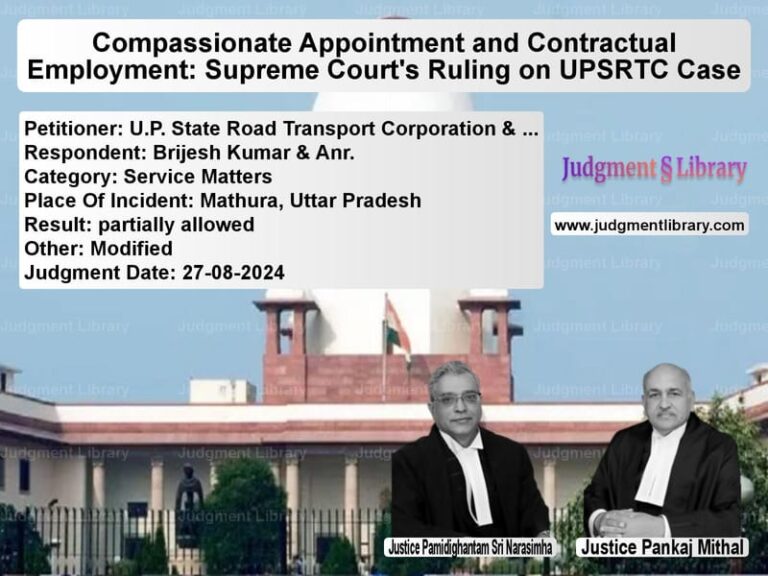Supreme Court Orders Reconsideration in JSW Steel’s ₹70 Crore Port Wreckage Dispute
The Supreme Court of India, in JSW Steel Ltd. v. The Board of Trustees of the Mumbai Port Trust & Ors., ruled in favor of JSW Steel Ltd. by setting aside the Bombay High Court’s decision that dismissed its writ petition regarding liability for the removal of a sunken barge. The Court remanded the matter for reconsideration, emphasizing that the High Court had erroneously declared the case infructuous without deciding the fundamental question of law regarding responsibility under the Indian Ports Act, 1908.
Background of the Case
The case revolves around the sinking of the barge ‘Satyam’ in Mumbai’s harbor while transporting iron ore from JSW Steel’s vessel to the Dharamtar jetty. The Mumbai Port Trust invoked its authority under Section 14(1) of the Indian Ports Act, 1908, to direct JSW Steel to deposit ₹70 crores as security for the removal of the wreckage. Though the amount was deposited, JSW Steel challenged the liability imposed upon it, arguing that it was not the owner of the sunken barge.
Legal Issues Considered
- Whether JSW Steel, as the cargo owner, could be held liable for the wreck’s removal under the Indian Ports Act.
- Whether the High Court erred in declaring the writ petition infructuous without deciding on the substantive legal issue.
- Whether systemic delays in judicial proceedings could justify dismissing a petition that raises a significant question of law.
Arguments Presented
Petitioner’s Arguments (JSW Steel Ltd.)
- JSW Steel was not the owner of the barge ‘Satyam’; liability under the Indian Ports Act falls on the vessel’s owner.
- The High Court’s decision rendered the case infructuous despite JSW Steel raising a critical legal question regarding liability.
- The Mumbai Port Trust had already withdrawn the ₹70 crores deposited by JSW Steel, despite the legal uncertainty surrounding liability.
- Judicial delays should not prevent the resolution of a valid legal dispute.
Respondent’s Arguments (Mumbai Port Trust)
- The matter was prolonged for over 20 years, and the wreck had already been cleared, making the dispute unnecessary.
- JSW Steel had deposited the ₹70 crores voluntarily, indicating its acceptance of liability.
- The High Court correctly allowed JSW Steel the option to file a separate suit to reclaim the amount.
Supreme Court’s Observations
The Supreme Court found merit in JSW Steel’s arguments, stating that the High Court had prematurely disposed of the case without addressing the core legal issue. The Court observed:
- “The High Court failed to determine the fundamental legal question: Who is responsible for removing the wreck under Section 14(1) of the Indian Ports Act?”
- “Merely because time has passed does not render the legal dispute infructuous.”
- “When a constitutional court is called upon to interpret statutory liability, it must render a decision instead of dismissing the case on procedural grounds.”
- “Efflux of time, caused by systemic judicial delays, cannot be used to deny justice.”
Final Judgment
The Supreme Court ruled:
- The Bombay High Court’s order was set aside.
- The writ petition filed by JSW Steel Ltd. was revived and remanded to the High Court for reconsideration.
- If JSW Steel ultimately prevails, it would be entitled to a refund of the ₹70 crores with appropriate compensation.
- The High Court was directed to prioritize the case and dispose of it expeditiously.
Impact of the Judgment
- Judicial Accountability: The ruling reaffirms that courts must decide substantive legal questions rather than dismiss cases due to procedural delays.
- Clarity in Port Liabilities: The judgment will set a precedent on whether cargo owners can be held liable for the sinking of a third-party vessel.
- Right to Legal Recourse: Ensures that litigants retain the right to challenge financial liabilities imposed by government agencies.
Conclusion
The Supreme Court’s ruling in JSW Steel Ltd. v. Mumbai Port Trust & Ors. underscores the necessity for courts to resolve key legal disputes instead of dismissing them due to judicial delays. By remanding the case, the Court ensures that statutory obligations under the Indian Ports Act are thoroughly examined, setting a crucial precedent in maritime and corporate liability matters.
Petitioner Name: JSW Steel Ltd..Respondent Name: The Board of Trustees of the Mumbai Port Trust & Ors..Judgment By: Justice Ahsanuddin Amanullah, Justice Prashant Kumar Mishra.Place Of Incident: Mumbai, Maharashtra.Judgment Date: 14-02-2025.
Don’t miss out on the full details! Download the complete judgment in PDF format below and gain valuable insights instantly!
Download Judgment: jsw-steel-ltd.-vs-the-board-of-trustee-supreme-court-of-india-judgment-dated-14-02-2025.pdf
Directly Download Judgment: Directly download this Judgment
See all petitions in Company Law
See all petitions in unfair trade practices
See all petitions in Judgment by Ahsanuddin Amanullah
See all petitions in Judgment by Prashant Kumar Mishra
See all petitions in Remanded
See all petitions in Remanded
See all petitions in supreme court of India judgments February 2025
See all petitions in 2025 judgments
See all posts in Corporate and Commercial Cases Category
See all allowed petitions in Corporate and Commercial Cases Category
See all Dismissed petitions in Corporate and Commercial Cases Category
See all partially allowed petitions in Corporate and Commercial Cases Category







